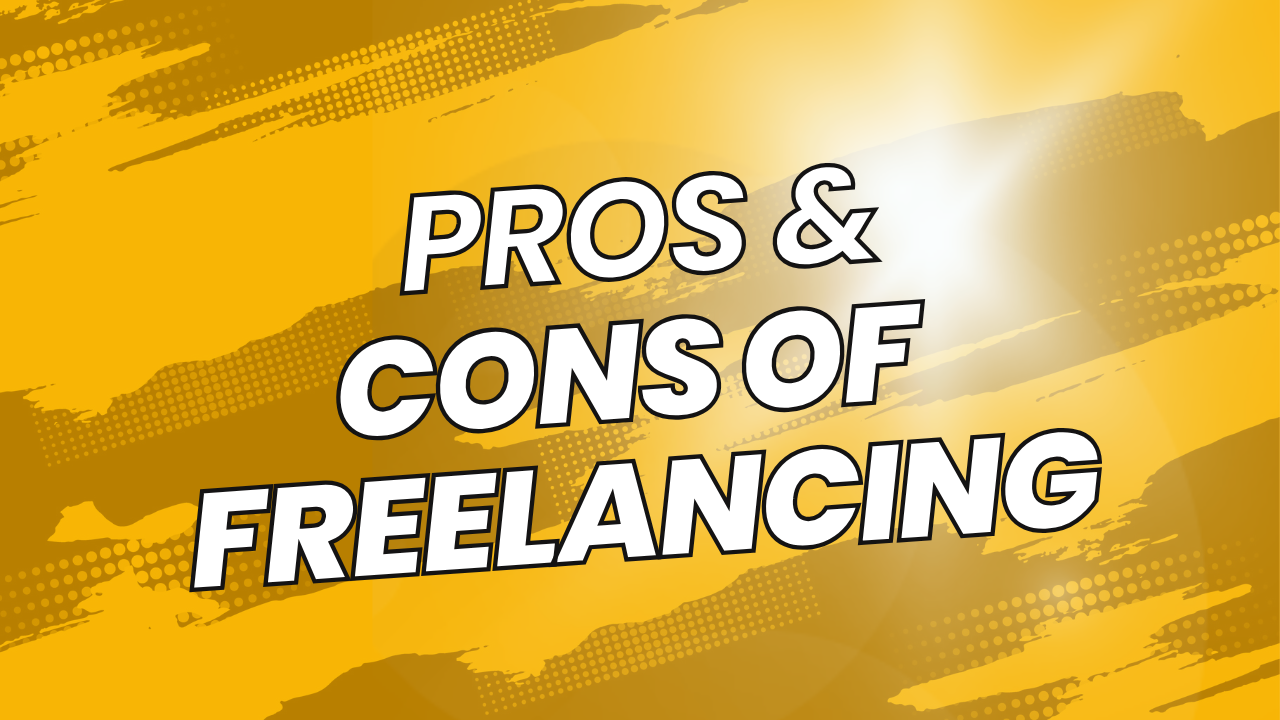Table of Contents
Freelancing has become a popular career choice for many professionals around the world. Whether you’re looking for flexibility, independence, or the opportunity to work on diverse projects, freelancing offers numerous benefits. However, it also comes with its fair share of challenges. Before diving into the world of freelancing, it’s essential to weigh the pros and cons to determine if it’s the right fit for you.
What is Freelancing?
Freelancing refers to working independently rather than being employed by a single company. Freelancers provide services to multiple clients, often on a contractual or project basis. This work structure allows them to choose their projects, set their schedules, and negotiate their rates.
Pros of Freelancing
1. Flexibility in Work Schedule: One of the biggest advantages of freelancing is the ability to set your own schedule. Unlike a traditional 9-to-5 job, freelancers have the freedom to work when they are most productive. This flexibility is especially beneficial for those who have personal commitments or prefer working at non-traditional hours.
2. Independence and Autonomy: Freelancers are their own bosses. They have the liberty to choose which projects to take on, how to complete them, and whom to work with. This autonomy allows for greater creative and professional satisfaction.
3. Unlimited Earning Potential: Unlike salaried employees who have a fixed income, freelancers can earn as much as they want. By taking on multiple clients, increasing their rates, and improving their skills, freelancers can significantly boost their income over time.
4. Work from Anywhere: Freelancers are not tied to a specific location. They can work from home, co-working spaces, coffee shops, or even while traveling. This remote work capability is especially appealing to digital nomads and those who prefer a change of scenery.
5. Variety of Projects and Clients: Freelancing offers exposure to a wide range of industries, projects, and clients. This diversity helps freelancers gain experience, develop new skills, and avoid monotony in their work.
6. Tax Deductions and Benefits: Freelancers can take advantage of tax deductions on business-related expenses such as home office setup, software, equipment, and internet costs. This can reduce taxable income and help manage expenses more efficiently.
7. Personal and Professional Growth: Freelancing requires self-discipline, time management, and problem-solving skills. It also encourages continuous learning and adaptation, which contributes to both personal and professional growth.
Cons of Freelancing
1. Irregular Income and Job Insecurity: One of the biggest challenges freelancers face is income instability. Unlike a full-time job with a steady paycheck, freelancers must constantly look for new projects and clients. This uncertainty can lead to financial stress, especially during slow periods.
2. No Employee Benefits: Freelancers do not receive benefits such as health insurance, retirement plans, paid leave, or job security. They must manage these aspects independently, which can be costly and require careful financial planning.
3. Difficulties in Finding Clients: Securing consistent work is a challenge, particularly for new freelancers. Building a client base requires marketing, networking, and self-promotion, which can be time-consuming and demanding.
4. Work-Life Balance Challenges: Since freelancers control their schedules, it can be tempting to overwork or underwork. Without a structured work environment, many freelancers struggle with maintaining a healthy work-life balance.
5. No Fixed Working Hours: While flexibility is a perk, it can also be a drawback. Freelancers often work odd hours to meet client deadlines, manage multiple projects, or accommodate different time zones.
6. Handling Administrative Tasks: Freelancers are responsible for managing invoices, contracts, taxes, and other administrative duties. This additional workload can be overwhelming, especially for those who prefer to focus solely on their craft.
7. Unpredictable Workload: Some months may be filled with projects, while others may be slow. Managing workload fluctuations requires strategic planning and financial management to sustain long-term stability.
Is Freelancing Right for You?
1. Financial Stability: Do you have savings or an alternative income source to cover expenses during slow periods? If not, a full-time transition to freelancing could be risky.
2. Self-Discipline & Time Management: Can you stay productive without supervision? Freelancers need strong self-discipline to manage their workload efficiently.
3. Tolerance for Uncertainty: Are you prepared for fluctuating income and job security? Success in freelancing requires resilience and adaptability.
4. Networking & Marketing Skills: Can you confidently promote yourself and find clients? Freelancers must actively market their services through social media, job platforms, and networking.
5. Industry Demand for Your Skills: Is there a market for your expertise? Research freelance job platforms and industry trends to assess your earning potential.
How to Succeed as a Freelancer
If you decide to pursue freelancing, follow these tips for success:
1. Build a Strong Portfolio: Showcase your best work through a portfolio website or online platforms to attract potential clients.
2. Set Competitive Pricing: Research market rates and set your pricing based on experience, skill level, and client demand.
3. Network and Market Yourself: Join freelancing communities, attend networking events, and use social media to promote your services.
4. Manage Finances Wisely: Save for taxes, invest in health insurance, and maintain an emergency fund to handle income fluctuations.
5. Maintain a Work-Life Balance: Establish boundaries by setting work hours and taking breaks to avoid burnout.
6. Keep Learning and Upgrading Skills: Stay updated with industry trends, take online courses, and enhance your skill set to remain competitive.
Our Recommendation
Freelancing offers flexibility, independence, and earning potential, making it an attractive career option for many. However, it also comes with challenges such as income instability, lack of benefits, and the need for self-discipline.
Carefully weighing the pros and cons can help you decide if freelancing aligns with your career goals and lifestyle. If you are willing to handle its challenges, freelancing can be a rewarding and fulfilling career choice.
Frequently Asked Questions
Freelancing offers flexibility, independence, and the ability to choose your clients and projects. You can set your own schedule and potentially earn more than a traditional job.
Freelancers often face inconsistent income, lack of job security, and the need for self-discipline. Finding clients and managing taxes and benefits are also key challenges.
Consider your financial stability, ability to handle uncertainty, self-motivation, and networking skills. If you value flexibility and independence, freelancing could be a good fit.
Yes, many people start freelancing as a side hustle before transitioning full-time. This helps build experience and financial stability before taking the leap.
Successful freelancers use multiple strategies, including networking, job platforms, referrals, social media marketing, and maintaining long-term client relationships.

Shridhar is a passionate career coach and expert writer with a focus on professional growth, job search strategies, and personal development. With years of experience in the corporate world, Shridhar understands the challenges professionals face in advancing their careers.


